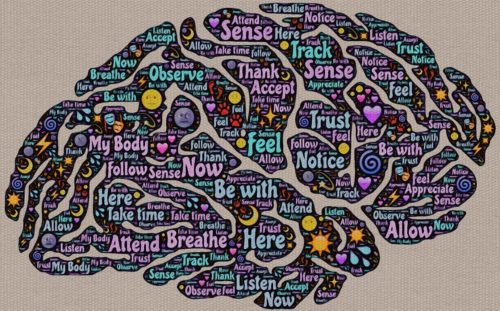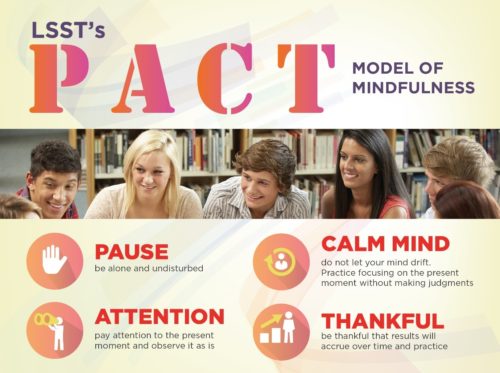COVID-19 lockdown: consolidating a student mindfulness model
By Kunal Chan Mehta | Article Date: 8 June 2020
To state that COVID-19 has been a mental health roller coaster is an understatement. Considering the continual lockdown and the severity of its impact, LSST speaks with industry professionals and proposes a mindfulness model.

It is now palpable that the psychological and social effects of the COVID-19 pandemic are persistent and prevalent and can affect mental health progressively.
As the pandemic is occurring against the backdrop of an increased incidence of mental health issues, LSST welcomes the recent launch of the University Mental Health Charter and Office for Student (OfS) Briefing Papers on Mental Health. Thus, the time to cooperatively consider mental health outcomes through alternative narratives, such as through the lens of mindfulness, has never been more manifest or meaningful:
Mental health during the lockdown
According to new global research by Ipsos Mori, Britons are most likely to be experiencing anxiety under lockdown than other health concerns. Almost 3 in 10 (28%) say they are suffering from anxiety under lockdown, more than the global average of 24%. Ongoing social isolation, solitude, health anxiety, stress, upsetting news stories, and an advancing economic slump are acting as the perfect storm to harm people’s mental health and wellbeing.

Chris Millward, Director for Fair Access and Participation, OfS, added: ‘The coronavirus pandemic has dramatically changed students’ day-to-day lives. While the physical health and safety of students is critical, looking after their mental health and wellbeing is vital in helping students to succeed and benefit from their time at university or college. It is important that universities and colleges recognise the impact the pandemic may have on students’ mental health and wellbeing and do all they can to support students effectively.’
The Lancet Psychiatry reveals that the UK lockdown and self-isolation policy are significantly impairing mental health. Commenting on the research, Irina Barariu, LSST’s Student Union President, said: ‘Too many people are underestimating the emotional impact of COVID-19. As the pandemic takes the central stage, people are mourning the loss of their former lives by missing the way things once were.’
The UK All Party Parliamentary Group on Students – a forum of MPs and their peers to discuss issues that affect students in higher education – found 33% of students had experienced suicidal thoughts. Further, poor mental health in higher education remains a significant problem, not only because it affects how students learn but because this also influences whether or not they obtain a degree. Ultimately, symptoms of poor mental health change the career potential and overall lives of students leading to depression – now the leading global cause of disability.
Speaking with LSST about the connection between employment and mental health, Tristram Hooley, Chief Research Officer at the Institute of Student Employers, said: ‘It has been a difficult time for everyone. Employers recognise this and the best are trying to be flexible and provide support for new staff to deal with the current situation. However, there is a well-acknowledged link between employment and mental health. If people have a reduced chance of finding good quality work as a result of the crisis, we should expect that mental health issues will increase.’
Read a mental health statement from LSST’s Student Union here
What about self-control?
Health psychology research looks at one crucial answer to mental health, which is all about self-control: the ability to suppress non-relevant intruding thoughts, behaviours, and emotions. Yet, while self-control leads to positive outcomes, repeated acts of self-control can lead to mental exhaustion and harm mental health and wellbeing.
Working and studying from home requires significant self-control, and whilst most campus environments are designed to engage students and staff in work, home environments are traditionally not. It is therefore essential to transition as much of the campus vibrancy to the virtual world (see: https://www.lsst.ac/news/covid-19-lockdown/).
A regeneration of higher education mental health?
Last year an LSST blog espoused that the entire higher education sector should join together and put student mental health first and keep it there as a planned priority. One giant step closer to this reality is the recently published University Mental Health Charter, a product of a significant amount of work by people across the sector and beyond. The Charter is a welcomed touchpoint to shape a future in which everyone can thrive by acting as a reference point to understand what good mental health practice is.
Additionally, in light of the ongoing lockdown, UUK has recently published a refreshed version of its strategic framework, Stepchange: mentally healthy universities. It calls on universities to prioritise mental health by taking a ‘whole university approach’, meaning that mental health and wellbeing is to be considered across every aspect of the university and its practices.
Professor Julia Buckingham, President of Universities UK and Vice-Chancellor of Brunel University London, said: ‘At this difficult and unprecedented time, during which universities have moved all of their student support provision online as well as supporting those students still living at university, we are releasing this framework because the top priority for all universities remains the safety, health and wellbeing of the entire university community.’
The higher education sector, and beyond, aspires for improved and more equal mental health and wellbeing outcomes for students and staff. Additionally, the Augar Report states that higher education plays a central role in enabling social mobility lifetime remunerative employment and higher levels of education that are associated with better physical and mental health.
A student mindfulness model – creating space between you and your thoughts
Mindfulness, recommended for those who want to improve their mental health and wellbeing, is when we are fully present and aware of what we are doing, while not being overwhelmed by what is occurring around us. While it may not be easy at the beginning, it gets better over practice.
Professor Rajita Sinha, director of the world-renowned Yale University Stress Center, says that mindfulness practice does not have to be convoluted. ‘It is really about being in the moment, observing what’s coming at you from the outside and what’s coming up inside—taking it in and observing, and not reacting to it.’
Anne Dutton, Director of Mindfulness Education, Yale University, says mindfulness is a practice that involves three components:
- • Paying attention to what is happening in the present moment
- • Doing this purposely and deliberately, with resolve
- • Maintaining the attitude that you will stay with your mindfulness experience, whether it is pleasant or unpleasant
World-leading psychology expert, Professor Sara Lazar, Harvard University, speaking with LSST about Dutton’s work, said: ‘This is what mindfulness is. At least the most basic aspect of it. There is complexity and nuance in terms of how it is applied to specific situations, but this is always the core component.’
Professor Lazar’s research shows that the mind’s constant chatter can be stopped by mindfulness – proving to be irreplaceable when people are worried about their health, staying distant from families and friends and job security during lockdown.
Speaking about mindfulness practice, Dr Wendy Wigley, LSST’s Head of Student Support and Enhancement, said: ‘I believe one of the most important messages to come out of the crisis is that it is OK not to be OK. The lockdown has impacted each of us in different ways. I encourage colleagues to be ‘mindfully aware’ when engaging with students during the lockdown. This means to listen to what students are really saying and to not ‘rush in’ and ‘fix’ the problem. During these unprecedented times, we can help each other by being more self-aware.’
Shan Wikoon, Lecturer in Business, LSST Elephant and Castle campus, said: ‘Using LSST’s PACT Model of Mindfulness can help with student challenges relating to mental health factors. The model can also assist lecturers in approaching mindfulness by paying attention to student concerns in the present moment in a calm and non-judgmental manner.’
Dr Julieta Galante, a mindfulness and mental health expert at Cambridge University, speaking with LSST about student mindfulness courses, said: ‘Our team has recently published a review of mindfulness courses for university students. We found encouraging evidence that they are effective for promoting mental health in the average student, including reducing anxiety. However, the low methodological quality of most of the trials found by the review precludes making firm recommendations for practice. The variability of the effects that we found means that some students in some contexts may not benefit from mindfulness. Of relevance for the current COVID-19 lockdown situation, our findings suggest that there may not be significant differences between self-help and instructor-led mindfulness courses.’
LSST’s PACT model of mindfulness
Working with LSST’s Student Union, a practical, memorable and student orientated mindfulness model has been proposed to promote positive mental health among the whole student population:

The right to optimal mental health
Poor mental health and its hidden health issues among students has profound adverse consequences in terms of the future of education providers and industry sectors that rely on graduates.
Everyone has the right to optimal mental health and mindfulness practices can help. The LSST PACT model aims to promote positive mental health among the whole student population.
Acknowledgements: LSST would like to thank the Office for Students, Universities UK, Cambridge University, Harvard University, Yale University, Ipsos MORI, the Institute of Student Employers and LSST’s Student Union for their comments and time.
Further reading
Dr Rowan Myron, Associate Professor in Healthcare Management and Adult Health, University of West London, one of LSST’s university partners, shares five top tips for keeping mentally well and improving your wellbeing during the ongoing pandemic.
How Students Can Think Positive During COVID–19: https://www.lsst.ac/blogs/positive_thinking/
How Students Can Confront COVID-19 Stress Whilst Studying From Home: https://www.lsst.ac/news/covid_19_stress_guide/
Mental Health in Higher Education and the Sector Challenges Ahead: https://www.lsst.ac/blogs/mental_health_in_he/
Contact kunal.mehta@lsst.ac to learn more about the PACT model.
6 thoughts on “COVID-19 lockdown: consolidating a student mindfulness model”
Comments are closed.





Masterfully written. Like a play about fact finding to produce a remedy to mental health. Great journey and a greater find LSST and hope the pact model goes a long way for your students. Jim